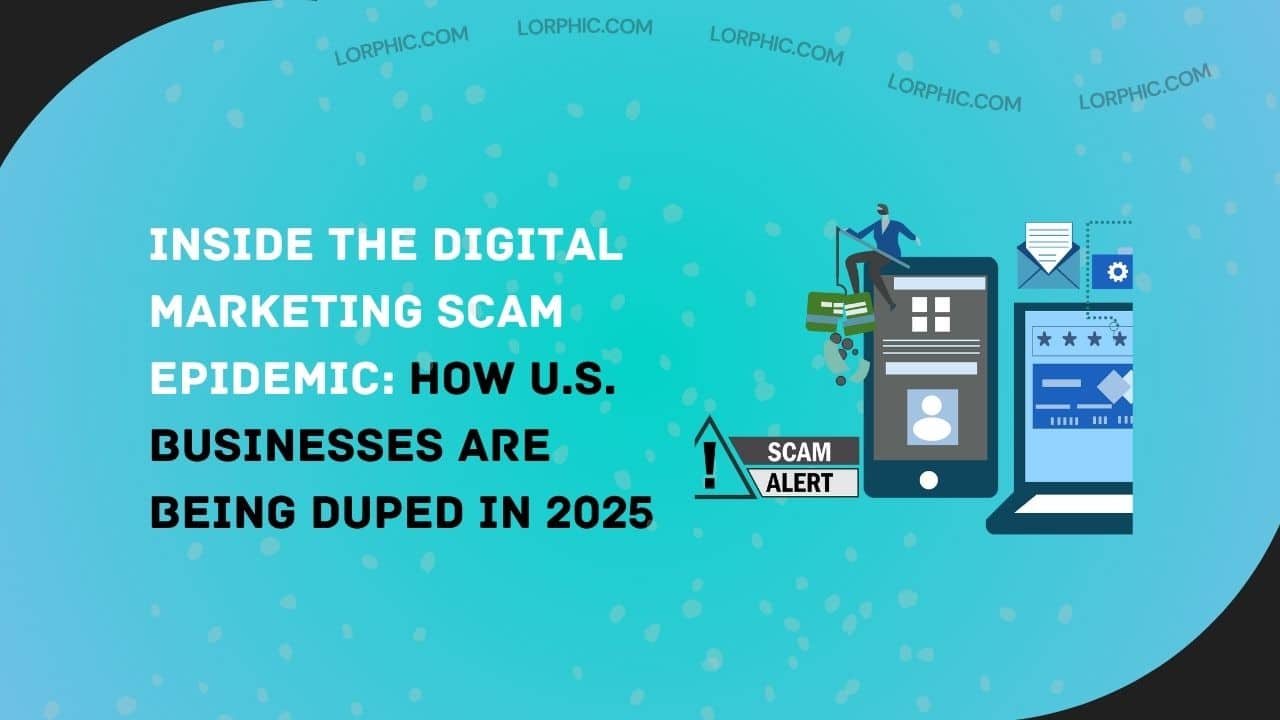Introduction: When Growth Promises Become Growth Pitfalls
You searched for a digital marketing company because you want growth, real leads, stronger visibility, and a brand that stands out online. But in today’s marketplace, the promise of growth often hides something more dangerous: the rise of the digital marketing scam.
Recent data from Pew Research Center shows Americans lost over $16.6 billion to online scams in 2024, much of it linked to fraudulent business-service offers and fake ad agencies. The Federal Trade Commission has also issued multiple warnings about “marketing consultants” using false credentials and AI-generated reviews to lure small businesses into paying for campaigns that never actually run. And according to WIRED, malversating, fraudulent ads that imitate real campaigns, continues to cost U.S. brands millions in wasted spend and reputational damage.
The message is clear: not every company promising clicks, leads, or SEO success is legitimate.
This article unpacks what’s really happening behind the scenes of modern ad fraud, how to spot the red flags, and how to choose a digital marketing company that’s transparent, data-driven, and truly invested in your growth, not your wallet.
The Rise of Fake Metrics and “Guaranteed Results”
In the world of digital marketing, one of the biggest warning signs of a digital marketing scam is the “guaranteed results” pitch. A vendor promises viral videos, thousands of leads, instant SEO domination, and you hand over your budget.
Here’s one real-world example: the Federal Trade Commission (FTC) has warned that fraudulent “marketing experts” often promise “guaranteed results” and use fake traffic, bots, or deceptive reports to appear successful, a growing form of digital marketing scam targeting small businesses.
Behind many of those scams was a digital marketing company that paid little attention to conversions or enduring value.
Why this matters:
- Many so-called campaigns generate traffic or clicks, but those metrics might be fake (bots, click farms) or irrelevant to your actual business goals.
- A digital marketing company might divert your budget into questionable placements or networks just to show “high numbers.”
- When things don’t convert, your real cost isn’t just the budget, you’ve lost time, trust and possibly your brand’s reputation.
Action for you: When vetting a digital marketing company, ask for real-world case studies with measurable outcomes, not just “views” or “likes”. Ask for conversions, qualified leads, and evidence that those leads became customers.
Ad Fraud & Malvertising: Your Brand Is at Risk
A major strand of the modern digital marketing scam involves malvertising (malicious advertising) and fake ad placements. According to Wired, malvertising in the U.S. search engine advertising and display ad networks increased 42% month-over-month in fall 2023 and rose another 41% in the following quarter.
Here’s how this connects to your digital marketing company:
- Your vendor might claim to buy “premium placements,” but the ad inventory could be fraudulent, or worse, tied to malware.
- Scammers take advantage of legitimate ad networks by hiding behind look-alike domains or twisted affiliate routes; your brand ends up paying for impressions that deliver nothing (or damage).
- Because your business likely lacks the resources of large brands, you may not notice the problem until it’s too late.
Tip: If you’re working with a digital marketing company, ask them:
- Which ad networks and placements will they use?
- Can they show you the actual domain and placement context?
- How do they monitor for click fraud, bot traffic or malicious redirects?
Deepfakes, AI Influencers & the Vanity Campaign Trap
We’re now at the stage where a digital marketing scam can use AI-generated videos, fake influencer endorsements and cloned voices to trick businesses and consumers. According to The New York Post, AI-fueled crypto scams surged 456% in the U.S. between May 2024 and April 2025.
While that article focuses on crypto, the same tech is spilling into digital marketing campaigns. A digital marketing company might pitch that they’ll use “top influencers” or “viral AI videos” for your brand, but if those influencers or videos are fabricated, what you get is hollow engagement and reputational risk.
What to check:
- Ask the proposed influencer for live footage, unfiltered, and verify their follower base for real engagement (not just numbers).
- Ask your digital marketing company: “How do you verify authenticity of influencers or video content?”
- If the promise sounds glamorous (“We’ll get you viral overnight”), be sceptical. Real growth takes consistency and authentic audience connection.
Small Business Vulnerability: Why You’re a Target
Small and local businesses are particularly exposed to digital marketing scams, often because you don’t have large in-house marketing teams, you’re trusting an external vendor, and you may not be trained to spot nuanced red flags.
Data shows that smaller firms face rapidly increasing fraud risk: for example, one Experian report noted that small business fraud increased significantly since the pandemic. Pew Research Center When you search for a “digital marketing company” you might be looking for an affordable solution, but that same affordability can mean less scrutiny on the vendor side.
How this plays out:
- A vendor pitches a low cost-high return campaign; you sign; you get traffic, maybe even leads, but none that convert.
- You find out the vendor locked you into a contract, owns your ad account, or places your ads in poor-quality networks.
- You’re left paying for drained budgets, dodgy leads, and the effort to recover wasted time.
What you can do:
- Make sure you always own your ad/analytics accounts; don’t hand them over entirely.
- Set short-term performance review points with your digital marketing company (e.g., 90 days) instead of long-term blind contracts.
- Use your budget as you would operate any business investment: monitor ROI, ask questions, demand transparency.
How to Select a Digital Marketing Company That Delivers, Not Disappears
You’re searching for a digital marketing company to help, not harm. Here are key criteria to use in your decision-making process:
• Transparency in account ownership
You should own your Google Ads, Facebook/Meta ads, and analytics data. Any vendor asking you to hand off full control is a red flag.
• Clear, measurable deliverables
Instead of vague promises like “go viral” or “get leads fast,” the contract should state things like: “increase qualified leads by 30% in six months,” or “reduce cost per acquisition by 20%.”
• Case studies and verifiable references
Ask for past clients in your niche. Are their results public? Can you verify traffic, conversions, and long-term outcomes?
• Realistic strategy (not magic bullets)
If the digital marketing company tells you “SEO done in 30 days” or “guaranteed #1 spot on Google,” be cautious. Real SEO results take time, typically several months of consistent optimization, content development, and backlink growth. Any agency claiming instant rankings is either inexperienced or running a digital marketing scam built on false promises.
• Fraud monitoring & brand safety
Ask how they monitor for click fraud, bot traffic, or invalid placements. Do they have systems in place? Are they transparent about ad spend and traffic sources?
• Exit/termination clauses
If things aren’t working, you should have the right to cancel without massive penalties. A vendor locking you in might be a sign of past clients stuck in under-delivering contracts.
The U.S. Treasury Sounds the Alarm
In late 2024, the U.S. Department of the Treasury issued a report confirming that Americans lost at least $10 billion to organized scam operations based in Southeast Asia.
These aren’t lone hackers in basements; they’re coordinated, well-funded networks running global digital-fraud factories. Their schemes range from fake investment campaigns and crypto ads to full-scale digital marketing scam ecosystems built to look authentic, complete with websites, testimonials, and ad placements.
The Treasury’s data connected several of these operations to cloned ad accounts and “ghost agencies” that sold small U.S. businesses “SEO & influencer packages” through social-media DMs and fake Upwork listings. Once the payment cleared, the websites vanished.
| Agency Type | Tactic Used | Average Reported Loss per Victim (2024) | Source |
|---|---|---|---|
| Fake “marketing agency” websites | Offered “guaranteed viral results” via influencers | $7,500 – $14,000 | U.S. Treasury Cyber Fraud Task Force |
| Cross-border scam networks | Posed as ad resellers & SEO vendors | $18,000+ (B2B avg.) | Treasury Press Release SB0278 |
| Click-farm & bot providers | Inflated engagement reports for small firms | $2,000 – $8,000 | FTC Consumer Protection Data Spotlight |
These findings underline a chilling truth: the “cheap package” you buy from a sketchy digital marketing company might not even be domestic, it could be run by a foreign syndicate laundering money through ad networks.
Wired: When Ads Become a Weapon
As In an investigative piece, WIRED revealed that malvertising, malicious code hidden inside online ads, has quietly become one of the biggest threats to brands in 2025.
Cybersecurity firms found tens of thousands of fake Google Ads and Bing Ads pointing to copycat websites that delivered ransomware or credit-card skimmers. The kicker? Many of these fake ads were purchased through automated bidding systems by impostor “marketing vendors.”
Brands ended up paying for the placements themselves, literally funding the fraud that targeted their own customers. It’s a perfect example of how a digital marketing scam can hijack a company’s good name, using automation against the very system it was meant to optimize.
The New York Post: AI Scams and the Rise of the Deepfake Marketer
Meanwhile, The New York Post reported that AI-driven scams jumped 456 percent in 2025. Fraudsters now use generative AI to fabricate influencer videos, clone real marketing professionals, and even simulate live Zoom consultations. Victims believe they’re hiring a seasoned strategist or a reputable digital marketing company, but in reality, they’re wiring money to a synthetic persona.
One Connecticut bakery owner told reporters she thought she was signing a deal with a “Google-certified” ad consultant who had a slick video portfolio and LinkedIn endorsements. Every clip, every testimonial, every “meeting” , was AI-generated. She lost $9,800 before realizing the entire agency didn’t exist.
This is the future of fraud: believable faces, real-time conversations, and zero accountability. The digital marketing scam of 2025 doesn’t need to hack you; it just needs to convince you.
Together, these stories show that modern scams are industrialized, data-driven, and emotionally manipulative. They don’t just sell you bad ads, they sell you trust, then cash out before you even notice. And that’s why small businesses need to vet every digital marketing company like it’s a financial institution, not a friendly vendor.
Final Thoughts: Protecting Your Strategy, Budget & Brand
So where does this leave you ~ the entrepreneur, the marketer, the business owner trying to grow?
You came here looking for the right digital marketing company, hoping for progress, not pitfalls. But in an age where scams wear suits and carry certificates, diligence is your best strategy.
The New Rule of Marketing: Verify Before You Amplify
A decade ago, due diligence meant checking a website and reading a few reviews.
In 2025, it means cross-checking company registration, verifying ad-account IDs, auditing performance data, and asking for live references.
Here’s a quick credibility checklist:
| Checkpoint | Why It Matters | What to Ask |
|---|---|---|
| Transparent ownership of ad accounts | Ensures you can’t be locked out of your data | “Will I have admin access to all platforms?” |
| Real-time reporting (not screenshots) | Screenshots can be faked; dashboards can’t | “Can I view campaigns directly in-platform?” |
| Verified payment channels | Avoids wire fraud & false billing | “Do you invoice through a verified merchant or escrow?” |
| Authentic case studies | Distinguishes real success from AI fabrications | “Can I contact one of these clients directly?” |
These aren’t just safety checks, they’re your insurance policy against a digital marketing scam.
Turn Skepticism into a Strategy
Healthy skepticism doesn’t mean cynicism.
It means you expect proof, not promises; data, not drama. The best digital marketing company will welcome that mindset because transparency is part of their brand.
- Ask for clarity early. If the answers get vague, pause the conversation.
- Monitor weekly. Don’t wait three months for a quarterly review.
- Audit results yourself. Compare sales lift with reported “leads.”
- Keep ownership. Never let someone else hold your logins or billing rights.
The Bigger Picture: Building Trust in a Distrustful Market

Digital marketing used to be about creativity. Now it’s equally about credibility.
Search engines reward real content, customers reward honesty, and regulators are finally stepping in. The FTC’s 2025 “Transparency in Digital Advertising” initiative now requires clearer disclosures for agencies and ad resellers, a promising sign that the tide is turning.
But legislation alone can’t protect your business. Awareness can.
Every legitimate digital marketing company shares the same goal as you: sustainable growth built on real results. The rest are short-term opportunists who thrive on confusion and fear of missing out.
In Closing: Choose Knowledge Over Noise
The line between marketing innovation and manipulation has never been thinner.
When you find a trustworthy digital marketing company, you’re not just outsourcing promotion, you’re gaining a partner who values your success as their own.
When you fall for a digital marketing scam, you’re buying illusion, not impact.
So the next time someone promises to “make your business viral,” pause.
Ask for receipts, ask for data, ask for honesty.
Because in 2025, the smartest marketing move isn’t chasing hype, it’s protecting your strategy, budget, and brand from those who profit off your ambition.
Your growth story deserves to be real. Make sure the people helping you write it are, too.
Curated by Lorphic
Digital intelligence. Clarity. Truth.




